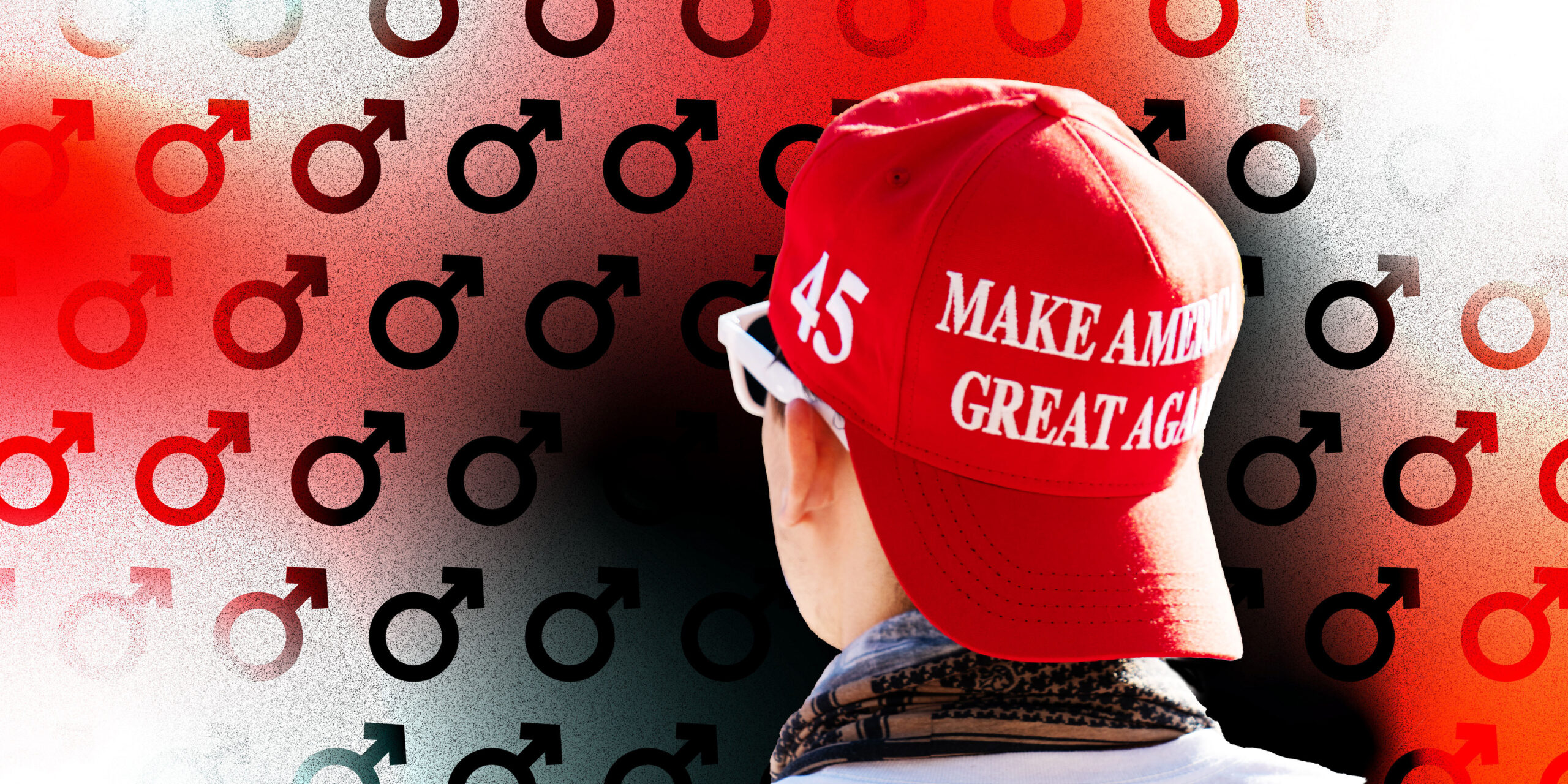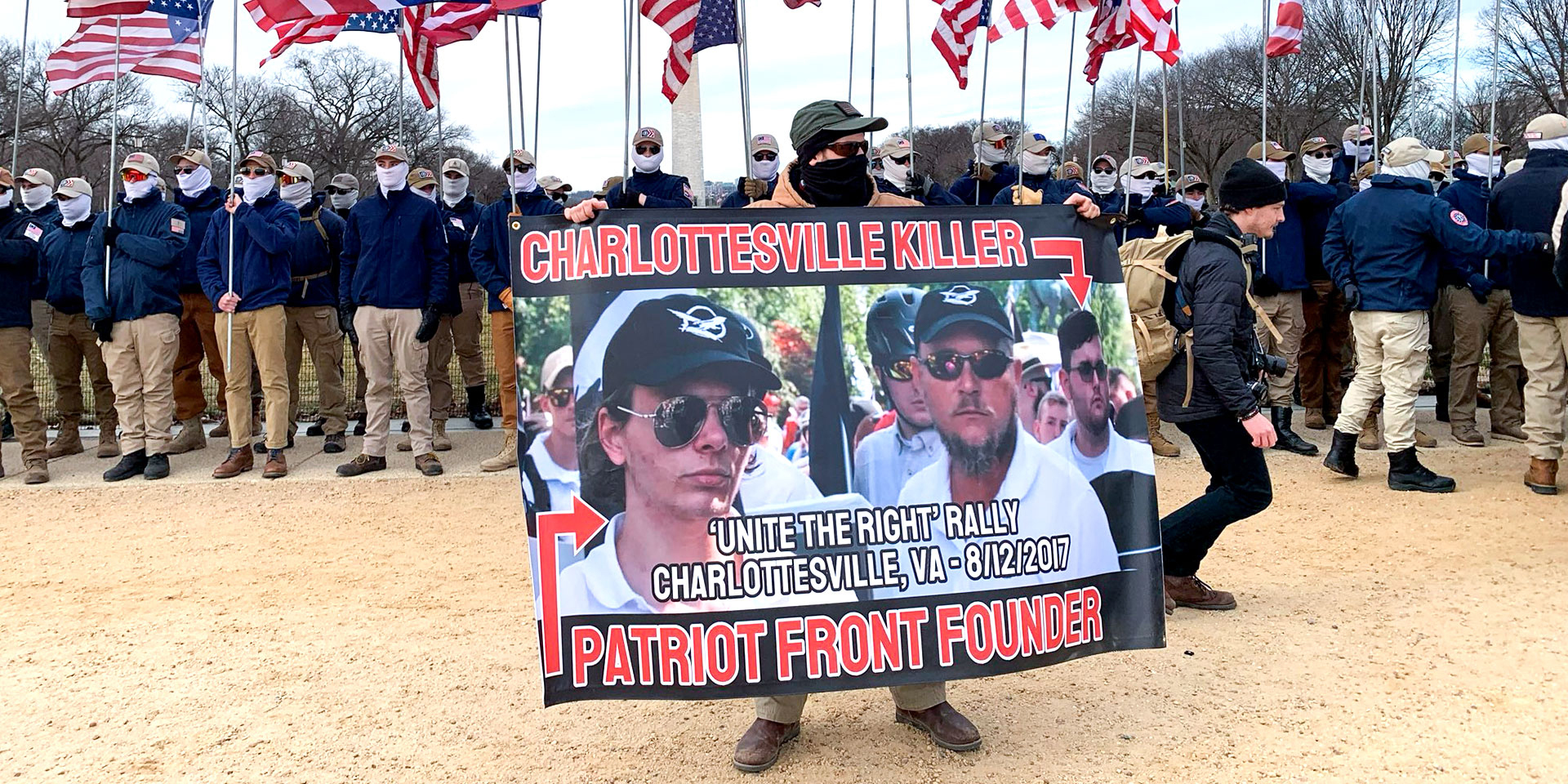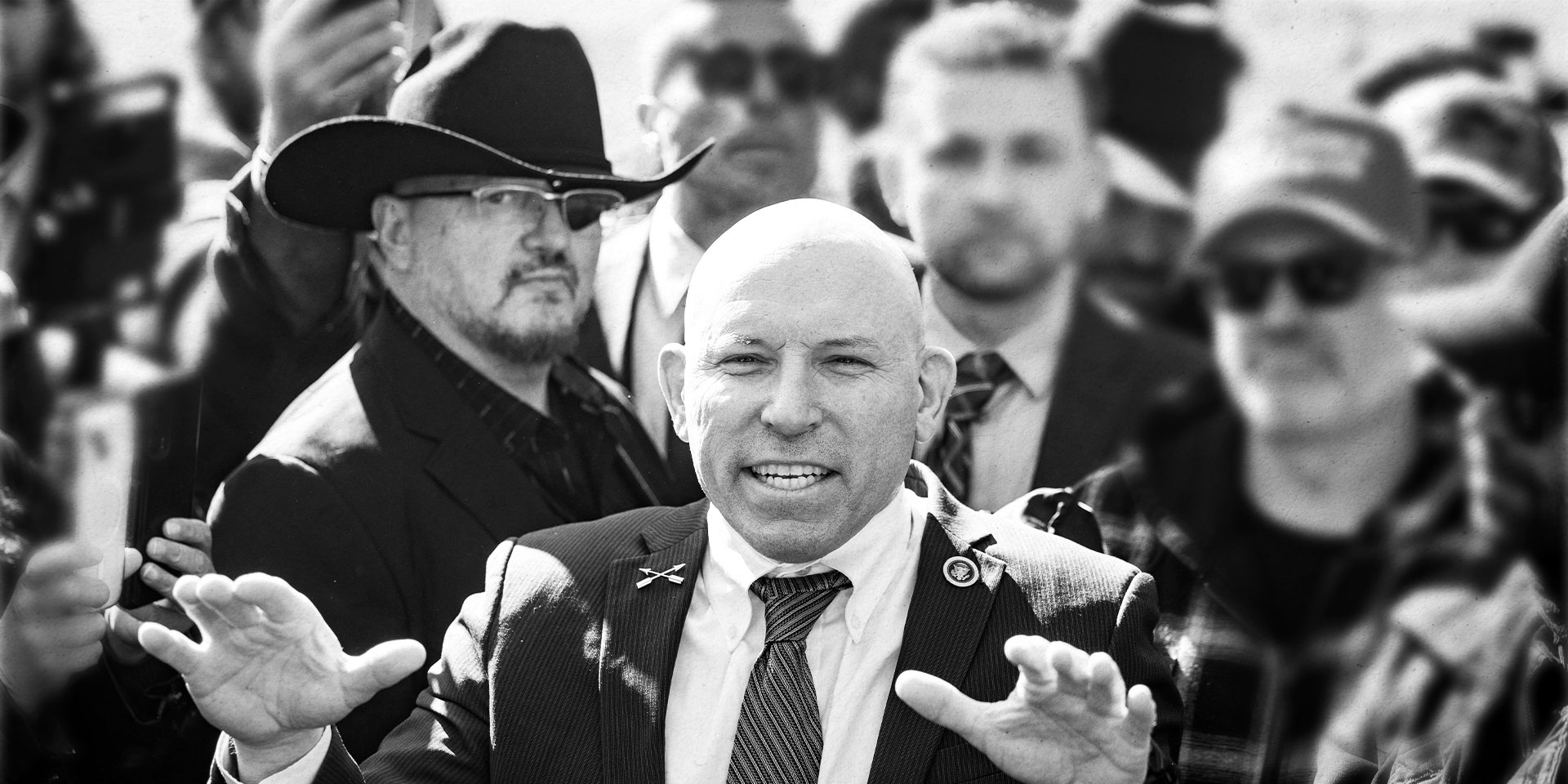Far-right extremists celebrated President Donald Trump’s 2024 election as an opportunity to further entrench a male supremacist culture that is permissive to violence against women. And within his first 100 days, Trump has validated their optimism.
Through his appointments of white men dogged by allegations of sexual harassment, abuse and violence, Trump has publicly affirmed his hostility for feminism to his male supporters and fed the male supremacist belief that white men are victims threatened by a changing social order, whose privilege must be restored and protected.
There are serious consequences to selecting male supremacists and potential perpetrators of violence against women to top government positions, both for the women working in these agencies and for the rest of the country. His actions will strengthen hierarchies of both gender and race, disproportionately harming women of color.
As the election results came in last year on Nov. 5, white nationalist Nick Fuentes tweeted: “Your body, my choice. Forever.” The tweet was viewed over 100 million times and became a popular refrain to harass girls in school. The following day, Andrew Tate, a social media influencer who faces allegations of rape and human trafficking, tweeted of women, “You no longer have rights.” A Texas Proud Boys chapter shared a meme depicting The Handmaid’s Tale dystopia, threatening, “Dear feminists: this is your life now.”
Many Trump supporters, particularly the far-right flank, see Trump’s victory as a rebuke of feminism and progressive politics. He symbolizes the forceful rollback of women’s rights.
Trump’s new administration has welcomed many personnel with histories of sexual misconduct. In the first few weeks after he was reelected to the presidency, Fortune reported nearly one-third of his Cabinet nominees and other key members of his administration had allegations of sexual misconduct.
Beyond his Cabinet, at least two of Trump’s ambassador picks also have allegations of sexual harassment, discrimination and domestic violence. Trump also selected Andrew Kloster, a self-identified “raging misogynist” who was also accused of domestic violence and subject to a temporary restraining order in 2022, which was dismissed days later as part of an agreement, as general counsel for the Office of Personnel Management.
Trump himself faces at least 26 known allegations of sexual harassment and misconduct. This includes one that led a New York City jury to find him liable for sexual abuse and a judge to declare the accusation of rape as “substantially true.”
Historically, credible allegations of gender-based harassment — and even violence — have rarely been seen as disqualifying for office, as evidenced by the elections of Bill Clinton, Donald Trump and Joe Biden, the confirmations of Clarence Thomas and Brett Kavanaugh to the U.S. Supreme Court, and many others at the state level of government.
What is unique to this administration is the sheer breadth of accusations and the advantage they seem to serve as a propaganda tool. Trump’s leadership team and his own record of misogyny mobilizes rising resentment toward feminism. It is an asset to a political party committed to “triggering the libs” as they harness male supremacy and white supremacy to cast men — and, especially, white men — as the ultimate victims of a changing social order.
Personnel as policy
In their article for the Council on Foreign Relations, Jacob Ware and Noël James wrote that by nominating candidates “who have been accused or found guilty of sexual harassment for consideration for top positions leading the government, a message is sent to the public that renders these crimes as insignificant in regards to service in the government, alongside broader approval that legitimizes crimes related to violence against women.”
Trump has rallied support from his base by repeatedly mocking survivors and the #MeToo movement. He has reiterated concerns that the movement had gone too far and made men the real victims. As journalist Joshua Green argued, Steve Bannon, Trump’s close ally and former chief strategist, saw the movement as an “existential threat” to Trump and Republican congressmen. These nominations signal a rejection of progressive efforts to build a more inclusive society and a rebuke of supposed “woke” politics. Robert F. Kennedy Jr., who has been accused of sexually harassing and groping his former babysitter, now leads the Department of Health and Human Services — an agency where he has a great deal of power over policies that impact women’s health and, especially, the health of women living in poverty and women of color.
Under Kennedy’s leadership, the agency is already showing signs of tolerating sexual harassment and inappropriate behavior. Before he was officially approved to lead the department, his team added a demeaning employee application to his “Make America Healthy Again” website. The 90-minute personality quiz asked applicants to evaluate their “interest in having sexual experiences with another person” and report if they “use [their] physical appearance to draw attention to [themselves].” Additional gendered questions included asking applicants how much they agreed with statements like “Modesty does not become me” and “I get upset when people don’t notice how I look when I go out in public.” A member of the Trump transition team and a Kennedy spokesperson confirmed the legitimacy of the application.
It was later revealed that the “neuropsychological assessment company” that developed the test is run by the Canadian academic Jordan Peterson. Peterson presents himself as a self-help mentor interested in supporting boys and men, which has helped him become a prominent figure in the men’s rights activist (MRA) movement. This support includes claims that feminists have an “unconscious wish for brutal male domination” and offering “enforced monogamy” as the solution to misogynist incel violence.
Secretary of Defense Pete Hegseth was accused of raping a woman in 2017 and described as “abusive” in an affidavit to the Senate Armed Services Committee written by his former sister-in-law. His mother told him he was “an abuser of women” in an email.
On a podcast in November 2024, Hegseth said, “I’m straight up just saying we should not have women in combat roles.” In his 2024 book The War on Warriors: Behind the Betrayal of the Men Who Keep Us Free, he wrote, “Women cannot physically meet the same standards as men.” In another comment in this book, he promoted biological essentialism, reducing women to their maternal value. He wrote: “Dads push us to take risks. Moms put the training wheels on our bikes. We need moms. But not in the military.” Hegseth’s actions as secretary of defense will have a disproportionate impact on Black women, who make up 29% of active-duty enlisted women.
Male supremacists celebrated these views and what they indicated about women’s position in society. One post on a prominent online forum, which the Southern Poverty Law Center defines as a hate group, asked, “Will Donald Trump’s 2nd Term Turn The US Into A More Patriarchal Society?” The user specifically noted Hegseth’s views on women and his hope this would help diminish the influence of feminism. Despite some support for Trump and Hegseth in the thread, most users denigrated Trump, arguing that his views and policies are not extreme enough for their tastes.
Immediately into his tenure as secretary of defense, Hegseth took steps to institutionalize his male supremacist view. When he fired the Navy’s first woman chief of naval operations, Lisa Franchetti, Military.com reported that many service members took the firing to mean that “women are no longer welcome in the military’s highest ranks.” He also removed military websites that highlighted women service members and their contributions to protecting the American people and U.S. interests at home and abroad.
From promises of safety to dangerous policies
During a campaign dominated by visible misogyny, Trump ominously promised to protect women, “whether they like it or not.” Within the first few weeks of his new administration, however, Trump’s Department of Education announced it would revert to enforcing the 2020 Title IX guidance, making it harder for K-12 and university students to report sexual misconduct and discrimination — sending an important message about this administration’s vision for women and its trivialization of gender-based violence. That action will also disproportionately harm Black women, who face an even greater risk of sexual violence.
During Trump’s first administration, then-Secretary of Education Betsy DeVos held a summit on Title IX where she consulted with the Carolinas chapter of the male supremacist hate group National Coalition for Men and other men’s rights activist (MRA) organizations. Title IX is part of federal civil rights legislation that bans sex discrimination at educational institutions that receive federal funding. This includes gender- and sex-based harassment, stalking, relationship violence and sexual violence. MRAs are ideologically opposed to these Title IX protections, which they believe unfairly privileges women at the expense of maligning men and contributing to what they consider to be “an epidemic of false rape allegations.”
Reporting from Democracy Forward revealed an extensive relationship between DeVos’ Department of Education and these organizations, who were directly involved in drafting new Title IX regulations. In September 2017, DeVos announced these changes, which weakened federal guidance on reporting, investigating and responding to sexual assault and harassment allegations at K-12 schools and universities while offering new protections to accused perpetrators. The new Trump administration’s decision to reaffirm this guidance leaves survivors vulnerable and unsupported.
As Trump’s Department of Education was dismantling protections against gender-based violence, other high-level officials in the Trump administration worked to bring one of the most prolific male supremacists back to the U.S. Within Trump’s first month in office, members of his administration repeatedly pushed Romanian authorities to lift travel restrictions on Andrew and Tristan Tate and allow the brothers to return to the U.S. to await their trial.
The Tate brothers are charged with rape, human trafficking and forming an organized crime group. Romanian authorities identified at least 35 known victims of their sex-trafficking operation, including a minor.
Both brothers deny the charges against them. However, after moving to Romania in 2017, Andrew Tate publicly boasted that the decision was partially “because rape laws are more lenient here.” Rolling Stone released leaked screenshots between Andrew Tate and his associates that appear to show him bragging about manipulating one of the victims listed by Romanian prosecutors into doing sex work. Allegedly, the Tate brothers continued this abusive operation even while under house arrest.
Additionally, as one of his first acts as president, Trump signed an executive order claiming to defend women “from gender ideology and extremism” and only recognizing two sexes, male and female. Rather than furthering women’s rights or gender equity, the order attacks trans girls and women by denying their identity. It designates them as a threat to cisgender women and girls and prohibits them from fully engaging in public spaces. Black transgender and nonbinary people could face compounding discriminatory experiences. According to a report from Williams Institute School of Law at UCLA, half of nonbinary adults in the U.S. workforce are people of color. This comes at a time when right-wing authoritarians across Europe and Latin America are using supposed “gender ideology” and a stated interest in protecting women and “natural” families as cover to roll back women’s advancement alongside LGBTQ+ rights.
Project 2025, The Heritage Foundation’s blueprint to radically reshape the federal government during the Trump administration’s first 180 days, outlines plans to roll back protections against sex discrimination in education and the workplace. It also calls for heavy restrictions on abortion access, birth control and gender-affirming care, and its recommendations threaten the privacy rights of patients who receive abortion care.
These restrictions will have a disparate impact on women of color and those who live in poverty, in addition to further exacerbating the gap in maternal mortality between white and Black women. Despite trying to distance himself from Project 2025 during his campaign, Trump has since selected several of its authors to fill key positions within his administration and has taken steps to force this deeply unpopular policy agenda on the American people.
The ideology of the Trump administration seems to be inching closer to that of organized far-right extremists. On a recent podcast, for example, male supremacist Myron Gaines explained, “You got to protect women from themselves … they’re indecisive, they’re bad decision-makers, a lot of times they’re stupid.” He said, “when women have authority, things go down f—— hill.”
This is the version of protection the Trump administration is advocating for: “protecting” women by restoring traditional restrictive gender roles and enforcing a social hierarchy dominated by cisgender men and permissive of violence against women.
Image at top: For many supporters, President Trump symbolizes the forceful rollback of women’s rights. (Credit: SPLC)
The SPLC and American University’s Polarization & Extremism Research & Innovation Lab have published Not Just a Joke: Understanding & Preventing Gender- & Sexuality-Based Bigotry. The guide helps readers identify warning signs that a young person has become susceptible to these ideologies, best practices for responding and ways to build resilience against manipulation. It also provides guidance on how to support and care for those who have been harmed by people who have been influenced by or hold bigoted beliefs.






